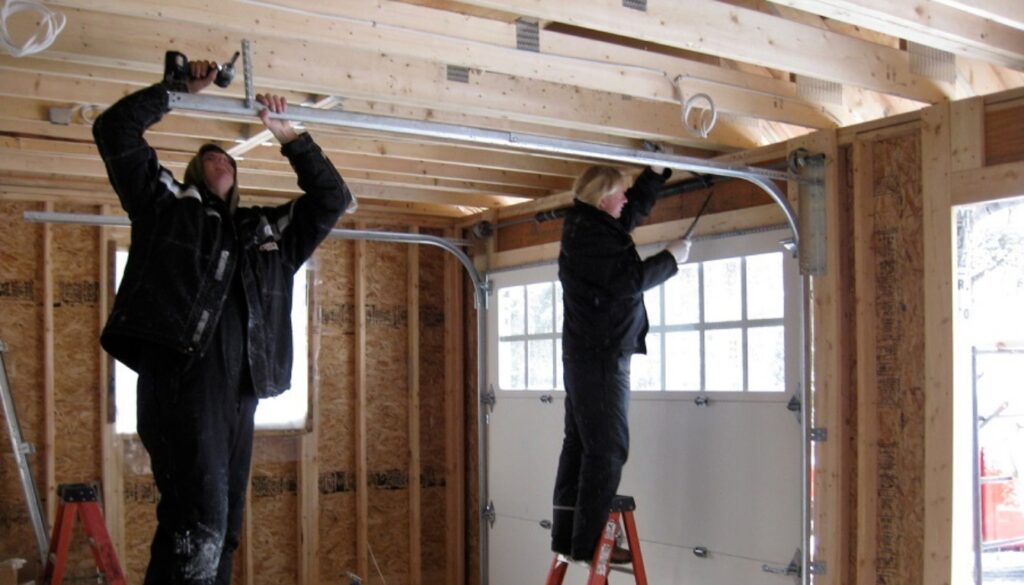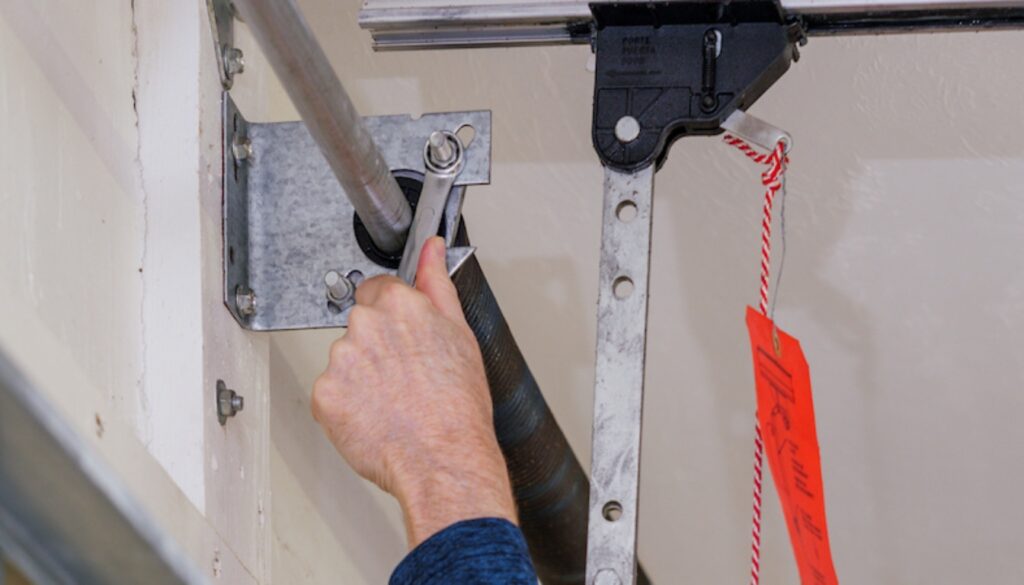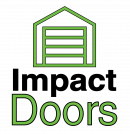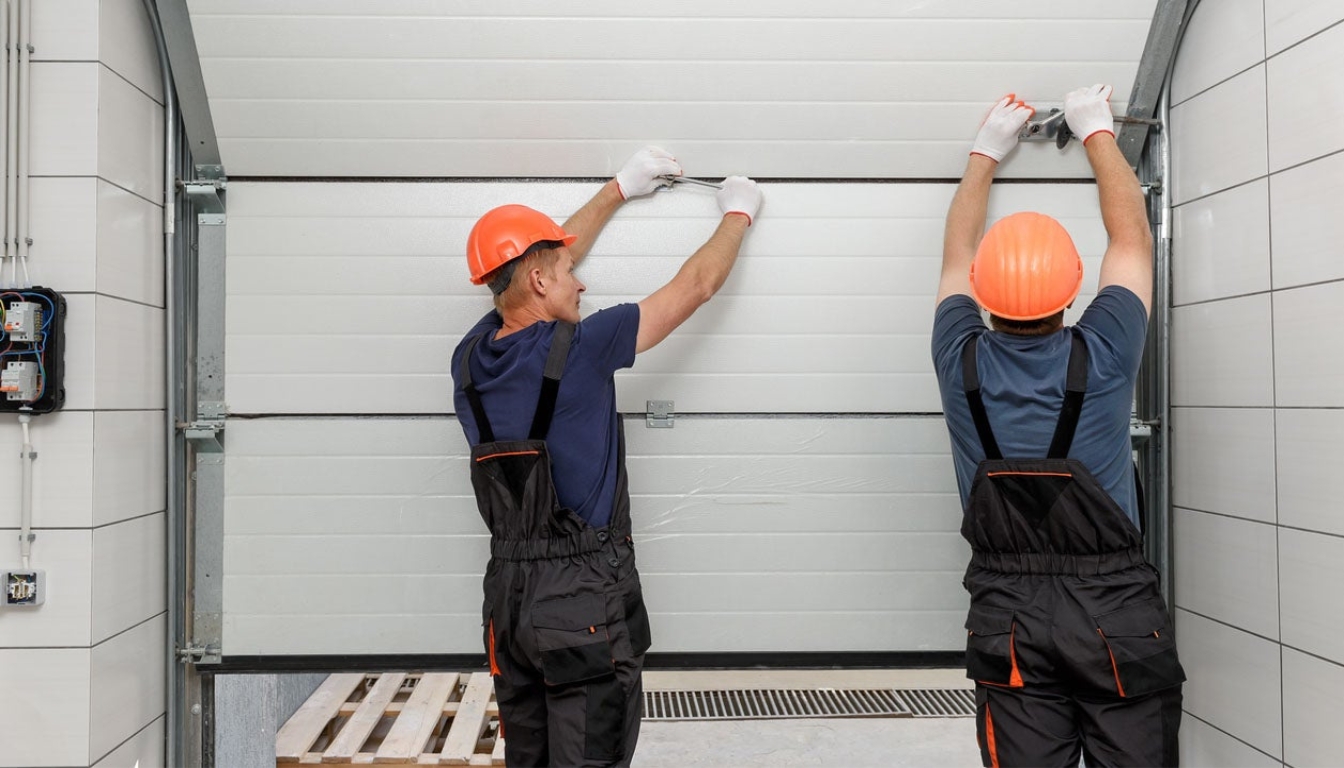Is your garage door making loud noises? This is a common problem many homeowners face. Poor lubrication, worn rollers, or misaligned tracks can cause this issue. Our article will help you understand these causes and provide practical fixes.
For more information about what causes a noisy garage door, contact us for garage door repairs in Narangba.
Key Takeaways
- Poor lubrication, worn rollers, and misaligned tracks commonly cause noisy garage doors. Regular maintenance prevents these issues.
- Replace plastic rollers every two years; nylon rollers are quieter and offer a longer-lasting solution.
- Bent or misaligned tracks create grinding noises and hinder smooth door operation. Straighten with a rubber mallet or replace if necessary.
- Lubricate moving parts like rollers, hinges, and springs with silicone spray or white lithium grease every six months to avoid rust and reduce noise.
- Call a professional if loud noises persist after DIY fixes, indicating significant wear or trouble balancing the door for safe operation.
Common Causes of a Noisy Garage Door
A noisy garage door can disrupt your peace. It often results from worn parts or lack of proper maintenance.
Worn or Damaged Rollers
Worn rollers create loud squeaking and screeching. Plastic rollers need replacement every two years. Steel rollers last longer but rust over time. Nylon rollers reduce noise more effectively and offer a quieter solution.
Damaged rollers cause the garage door to vibrate excessively. The result is noisy movements when opening or closing the door. Regularly inspect and replace these rollers to keep your garage door running smoothly.
Bent or Misaligned Tracks
Bent or misaligned tracks can make your garage door produce loud grinding, rattling, or squealing noises. Misalignment affects the smooth motion of the door and may also cause delays in response.
Fixing these issues involves checking for any visible bends in the tracks and straightening them with a rubber mallet if needed.
If tracks are damaged beyond simple repair, replacing them is necessary. This ensures that the rollers move smoothly without causing noise from metal friction. Always ensure tracks are correctly aligned by using a level tool to check their positioning on both sides of the garage door.
Worn Springs
Worn springs are among the common causes of garage door movement, often resulting in erratic opening and closing motions. Over time, these springs lose tension and may even snap. Loose or aging springs lead to scraping, banging, and popping sounds when you open or close the door.
This problem needs immediate attention because it affects the balance of the door.
Hire a professional for worn spring repair. “An off-balance door is unsafe,” experts warn. If ignored, this issue could make your loud garage door even worse and potentially dangerous.
Ensure that both torsion and extension springs are checked regularly for wear and tear to prevent future problems.
Dirty Rollers
Dirty rollers cause noisy garage doors. Dust and grime build up on them, leading to squeaky or rattling noises during operation. Regular maintenance can prevent these issues.
Schedule professional service for dirty rollers as needed. This keeps the garage door quiet and ensures smooth movements. Clean rollers help reduce excess vibration and extend the lifespan of your garage door system.
Lack of Lubrication
Poor lubrication can lead to rust, corrosion, squeaking, grinding, clinking, and rattling sounds in your garage door. To fix this problem, apply synthetic lubricant like Clopay Pro Lube or silicone spray every six months.
Regular use of white lithium grease also helps keep the parts moving smoothly.
Without proper lubrication, components like rollers and tracks wear out faster. This wear makes loud noises as the garage door opens or closes. Consistent maintenance with suitable lubricants prevents these issues and lengthens the life of your door parts.
Unbalanced Garage Doors
Off-balance doors make loud scraping, banging, and popping sounds. This often happens because of loose or aging springs, drive issues, added weight on the door, or impact damage. An unbalanced garage door poses safety risks and can cause more parts to wear out quickly.
Professional repair is needed to fix an off-balance door. Experts will adjust the tension in the springs and check for any other causes of imbalance. Regular maintenance helps keep your garage door working smoothly without those annoying noises.
Broken or Loose Cables
Loose cables can make your garage door noisy. Loose cables may cause the door to move unevenly, leading to strange sounds. These sounds can include rattling, grinding, and squealing.
Broken or loose cables lead to more noise. When a cable breaks, the garage door may slip off its tracks. This causes screeching or banging noises as it struggles to stay in place.
Keep your garage door running smoothly by checking all cables regularly for signs of wear and damage.
Troubleshooting Noisy Garage Doors

Troubleshooting Noisy Garage Doors:
Check and tighten all screws, bolts, and nuts. Lubricate the door’s moving parts with appropriate oil. Clean the tracks to remove dirt or debris. Adjust the door balance if it’s off.
Replace any worn rollers or hinges that no longer function well. Learn more about diagnosing common garage door issues for smoother operation and lasting performance.
Inspect and Tighten All Hardware
Loose hardware can create a noisy garage door. Tightening nuts and bolts can fix many issues.
- Check all bolts and screws on the door.
- Use a wrench or screwdriver.
- Ensure they are snug, but not overly tight.
- Inspect the hinges connecting the panels.
- Look for signs of wear or damage.
- Replace worn hinges if needed.
- Examine the brackets holding the tracks in place.
- Tighten any loose screws or bolts.
- Ensure the tracks are secure and aligned.
- Look at the roller brackets.
- Tighten these with a wrench if they seem loose.
- Confirm that rollers move smoothly in tracks.
- Check the torsion springs and mounting plates.
- Make sure they have no gaps between coils when relaxed.
- Inspect cables attached to springs and drum assemblies.
- Ensure cables are intact without fraying or tears.
Worn-out parts make noise when opening. Properly tightened hardware reduces vibrations, soundproof your garage door.
Lubricate Moving Parts Appropriately
Lubricating your garage door’s moving parts reduces noise and prevents wear. Use silicone spray or white lithium grease every six months.
- Apply Lubricant to Rollers
Coat the rollers with spray lubricant. Ensure they move smoothly along the tracks. - Grease Hinges
Apply a small amount of lubricant to each hinge. This helps reduce friction and noise. - Lubricate Springs
Spray the springs evenly with lubricant. This keeps them from getting rusty and noisy. - Treat Bearings
Use a few drops of oil on bearings if your door has them. Properly lubricated bearings ensure quieter operation. - Lubricate Chain or Screw Drive Opener
Apply a thin layer of white lithium grease to the chain or screw drive if you have this type of opener. Avoid over-lubrication to prevent dripping.
Inspect and tighten all hardware like bolts, nuts, and screws regularly for better performance.
Clean and Clear Tracks
A noisy garage door can be very annoying. Cleaning and clearing the tracks might fix this problem.
- Use a Damp Cloth – Wipe both sides of the track with a damp cloth to remove any dust or debris.
- Inspect for Obstructions – Check each section of the track for small objects like pebbles or dirt that could cause noise.
- Vacuum Loose Particles – Use a vacuum cleaner to suck up loose particles from inside the track grooves.
- Check for Damage – Look for any dents or bends in the tracks that might cause misalignment and noise.
- Straighten Bent Tracks – Carefully use pliers to straighten any bent sections if you find damage.
- Wipe Down Weekly – Make it a habit to wipe down tracks at least once a week to avoid buildup.
- Ensure Proper Alignment – Make sure the tracks are aligned properly by checking with a level tool. Always make sure in addressing garage door alignment issues to professionals.
Maintaining clean and clear tracks reduces noise, ensuring smooth garage door operation and leading us to check and adjust door balance next.
Check and Adjust Door Balance
A noisy garage door may be unbalanced. An off-balance door causes scraping, banging, and popping sounds.
- Disconnect the Opener: Pull the release cord to disconnect the automatic garage door opener.
- Manually Lift the Door: Slowly lift the garage door halfway and let go. The door should stay in place.
- Observe Door Movement: If it moves up or down, it is unbalanced.
- Check Springs: Examine if springs are loose or aging; these can cause imbalance.
- Inspect Cables: Look for broken or loose cables; these contribute to door noise and imbalance.
- Adjust Spring Tension: Use a torsion bar to adjust spring tension carefully.
- Test Balance Again: Manually move the door halfway to see if adjustments worked.
- Reconnect Opener: Attach the automatic opener once balance is restored.
These steps help fix a noisy garage door by ensuring proper balance.
Replace Worn Rollers and Hinges
Worn rollers and hinges cause lots of noise. Replacing them will fix this problem.
- Inspect Rollers
- Worn rollers can screech or vibrate.
- Plastic rollers should be replaced every 2 years.
- Nylon rollers make less noise and last longer.
- Choose New Rollers
- Select nylon rollers for quieter operation.
- Metal rollers can also be effective but may need more lubrication.
- Remove Old Rollers
- Disconnect the garage door opener.
- Lift the door manually to remove old rollers.
- Install New Rollers
- Slide new rollers into place on the track.
- Make sure they fit properly to avoid unsteady movements.
- Inspect Hinges
- Check for any cracks or wear in hinges.
- Replacing broken hinges prevents jerky door movements.
- Replace Hinges
- Unscrew old hinges carefully with a wrench.
- Install new hinges by tightening screws securely.
- Test the Door
- Open and close your garage door several times.
- Listen for any unusual sounds to ensure proper installation.
Following these steps keeps your door quiet and smooth. Fixing worn parts enhances both safety and functionality of your garage door system.
Preventative Maintenance Tips

4. Preventative Maintenance Tips: Regularly inspect and lubricate your garage door to avoid noise problems later on.
Regular Lubrication Schedule
Regular lubrication can help keep your garage door quiet. It prevents wear and makes the door last longer.
- Lubricate every six months. Use silicone spray or white lithium grease. These products work well for garage doors.
- Apply lubricant to moving parts. Focus on rollers, hinges, tracks, and springs.
- Spray rollers and bearings lightly. This helps reduce grinding noise and ensures smooth motion.
- Coat the springs carefully. This protects them from rust and keeps them flexible.
- Wipe away excess lubricant with a cloth. This avoids dirt buildup that could cause more noise.
- Inspect after lubricating. Make sure all parts move smoothly without sticking or squeaking.
- Avoid WD-40 for this job as it can attract dust and grime, which increases friction.
Implementing a regular lubrication schedule will keep your garage door running smoothly and quietly for years to come with minimal effort on your part! Regular maintenance is crucial to prevent noise and ensure smooth operation, but it’s also important to consider the costs of garage door installation and maintenance to keep your door in top shape.
Routine Inspection of Rollers and Tracks
Routine inspection of rollers and tracks keeps your garage door running smoothly. Some steps to follow ensure the door’s long-lasting performance.
- Inspect Tracks for Damage: Look at the tracks for bends or dents. Use a level tool to check alignment.
- Check Door Panels and Balance: Raise and lower the door manually. If it doesn’t stay open halfway, it is unbalanced.
- Inspect Springs and Hardware: Look for signs of wear on springs, bolts, and nuts. Replace any worn parts immediately.
- Check Rollers: Examine rollers for cracks or wear. Replace damaged rollers to prevent noise.
- Clean Tracks: Clear dust from the tracks using a damp cloth. Avoid using solvent cleaners that can attract grit.
- Lubricate Moving Parts: Apply lubrication to rollers, hinges, and springs every three months. Do not use grease; opt for silicone-based spray instead.
Regular maintenance helps avoid costly repairs later on.
Periodic Tightening of Hardware
Garage doors may start making noise if their hardware gets loose. Regular tightening helps keep the door quiet.
- Tighten Nuts and Bolts: Check all nuts and bolts. Use a socket wrench or impact wrench to tighten them. This stops vibrating, rumbling, and rattling.
- Check Hinges: Look at each hinge on the door. Tighten any loose screws with a multi-function 4-in-1 screwdriver.
- Inspect Brackets: Examine brackets holding the tracks to the walls and ceiling. Ensure they are tight with a socket wrench.
- Secure Rollers: Make sure roller brackets are firmly attached. Use your tools to tighten them if needed.
Next, we will discuss proper lubrication of garage doors.
Professional Annual Maintenance
Professional annual maintenance for your garage door is essential. Regular checks help prevent significant wear and costly repairs. Technicians will inspect, lubricate, and adjust all components.
They ensure the garage door operates smoothly and safely. In Burpengary East QLD, contact Impact Doors at (07) 5451 4022 for expert service. Annual maintenance can address issues like unbalanced doors or broken cables before they become major problems.
When to Call a Professional
Call a garage door repair professional if your garage door makes loud noises despite your efforts to fix it. Seek help for serious wear or trouble with balance.
Persistent Noise After DIY Fixes
Persistent noise after DIY fixes can point to a bigger issue. Faulty garage door components might need professional help. Impact Doors in Burpengary East QLD offer repair and maintenance services (07) 5451 4022.
Loud garage doors may have serious damage or improper installation.
If your garage door continues making loud noises, it could be from broken springs or worn cables. These parts require inspection by an expert for safety reasons. Fixing these problems ensures safe and smooth operation of the door.
Signs of Significant Wear or Damage
Broken or loose cables can create loud sounds when opening or closing your garage door. Frayed cables could cause the door to fall, leading to serious injuries. Worn springs might make squeaky noises, indicating they need replacement.
Bent or misaligned tracks result in banging noise when opening the door. This issue often causes the garage door to rattle during use. Inspect your roller door for wear; dirty rollers produce grinding sounds and affect performance.
Difficulty in Balancing the Door
An unbalanced garage door can cause scraping, banging, and popping sounds. This happens because loose or aging springs struggle to support the door’s weight evenly. Drive issues may also contribute by not distributing power properly.
If someone has added weight to the door (like insulation), it might throw off the balance even more.
Impact from objects can bend parts of the garage door system, making it hard for everything to move smoothly. To fix an unbalanced garage door, consult a professional for repair needs.
They will ensure your safety while addressing spring tension and drive alignment problems.
Conclusion
Worn rollers or tracks cause loud garage doors. Lubricate moving parts every six months to avoid noise. Tighten all hardware regularly for smooth operation. If noise persists, professional help ensures safety and efficiency.
Regular maintenance keeps your garage door quiet and reliable. Understanding how to fix structural issues in your garage door can help maintain its smooth operation and reduce noise.
FAQs
1. What are the common causes of garage door noise?
Common causes of garage door noise include poorly lubricated or worn-out rollers, improper installation, and unbalanced doors.
2. Why does my garage door make a loud noise when opening?
Your garage door makes a loud noise when opening due to reasons like worn-out rollers, lack of lubrication, or issues with the garage door opener chain.
3. How can I fix a noisy garage door?
To fix a noisy garage door, apply proper lubricant to the moving parts and check for any worn-out components that may need replacement.
4. Should I call a professional for my noisy garage door?
Yes! Call a professional if you hear loud noises from your garage door as they can identify problems like unbalanced doors or faulty springs.
5. Can poor maintenance cause my garage door to be noisy?
Yes! Poor maintenance can cause many issues including squeaky sounds and other common problems with your heavy-duty doors.
6. What should I do if my new garage door is making noise?
If your new garage door is making noise, ensure it was installed correctly and all parts are properly lubricated; otherwise, contact local services for repair assistance.
Garage Door Repair Near You
If your garage door needs repair, Jarred at Impact Doors is here to help. Our skilled technicians are experts in resolving any garage door issues efficiently, making sure your door operates smoothly and securely. Don’t let a broken garage door disrupt your routine—call us today at (07) 5451 4022 for prompt repair service.

